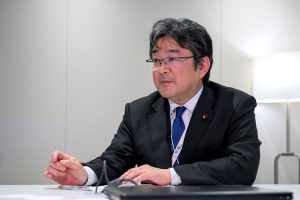ABU DHABI / WAM
Decarbonisation has become an important common challenge for Japan and the UAE, according to Yoshida Nobuhiro, Parliamentary Vice-Minister of Economy, Trade and Industry of Japan.
“The UAE is a key partner for Japan in clean energy endeavours, with a robust bilateral relationship over many years,” he said in an interview with the Emirates News Agency (WAM) during the World Future Energy Summit in Abu Dhabi, organised by Masdar, Abu Dhabi Future Energy Company.
Discussing bilateral economic relations, clean energy initiatives, and cooperation under the Abu Dhabi-headquartered International Renewable Energy Agency (IRENA), Nobuhiro reiterated Japan’s commitment to “global green energy hub” between Japan and the UAE as proposed by Japanese Prime Minister Fumio Kishida during his visit to the UAE last year.
The minister underscored collaborative efforts at the UN Climate Conference (COP28), successfully hosted by the UAE in Dubai last year, where Japan and the UAE worked together on various events. Prime Minister Kishida proposed to utilise the Japanese financial and technological capability to advance clean energy agendas across the world, especially in the Asia-Middle East region, he noted.
Speaking on bilateral technological collaboration, Nobuhiro pointed out that “Japan-UAE Coordination scheme for Advanced Technology (JU-CAT)” is facilitating tie-ups between Japanese tech startups and their UAE counterparts.
About his participation in the IRENA Annual Assembly held this week in Abu Dhabi, the minister emphasised Japan’s commitment to contributing to global efforts toward renewable energy deployment and net-zero emissions.
He reiterated Japan’s commitment to collaborating with IRENA and its 170 member states to facilitate a global energy transition.
On Japan’s journey toward net zero, he outlined ambitious targets, including achieving carbon neutrality by 2050 and reducing emissions by 46 percent by 2030.
Nobuhiro stressed the importance of diversifying energy sources, including renewables such as green hydrogen and ammonia, as well as promoting innovative technologies such as floating offshore wind and hydrogen-based steel production.
Recognising the global nature of decarbonisation efforts, the minister emphasised the need for international cooperation, particularly through initiatives like the Asia Zero Emission Community (AZEC), a platform launched by 11 partner countries in 2023 to promote decarbonisation in Asia.
Reflecting on the World Future Energy Summit (WFES), the Japanese official noted its significance as a platform for advancing discussions on renewable energy and environmental technology.
He emphasised the role of Japanese companies in showcasing clean energy solutions and advanced technologies at the summit, signalling further opportunities for collaboration on decarbonisation efforts worldwide.
On his participation at the Green Hydrogen Summit during the WFES, Nobuhiro said he stressed the importance of understanding diverse energy landscapes and stakeholders’ perspectives in developing a rule-based, transparent global market for hydrogen.
 The Gulf Time Newspaper One of the finest business newspapers in the UAE brought to you by our professional writers and editors.
The Gulf Time Newspaper One of the finest business newspapers in the UAE brought to you by our professional writers and editors.
